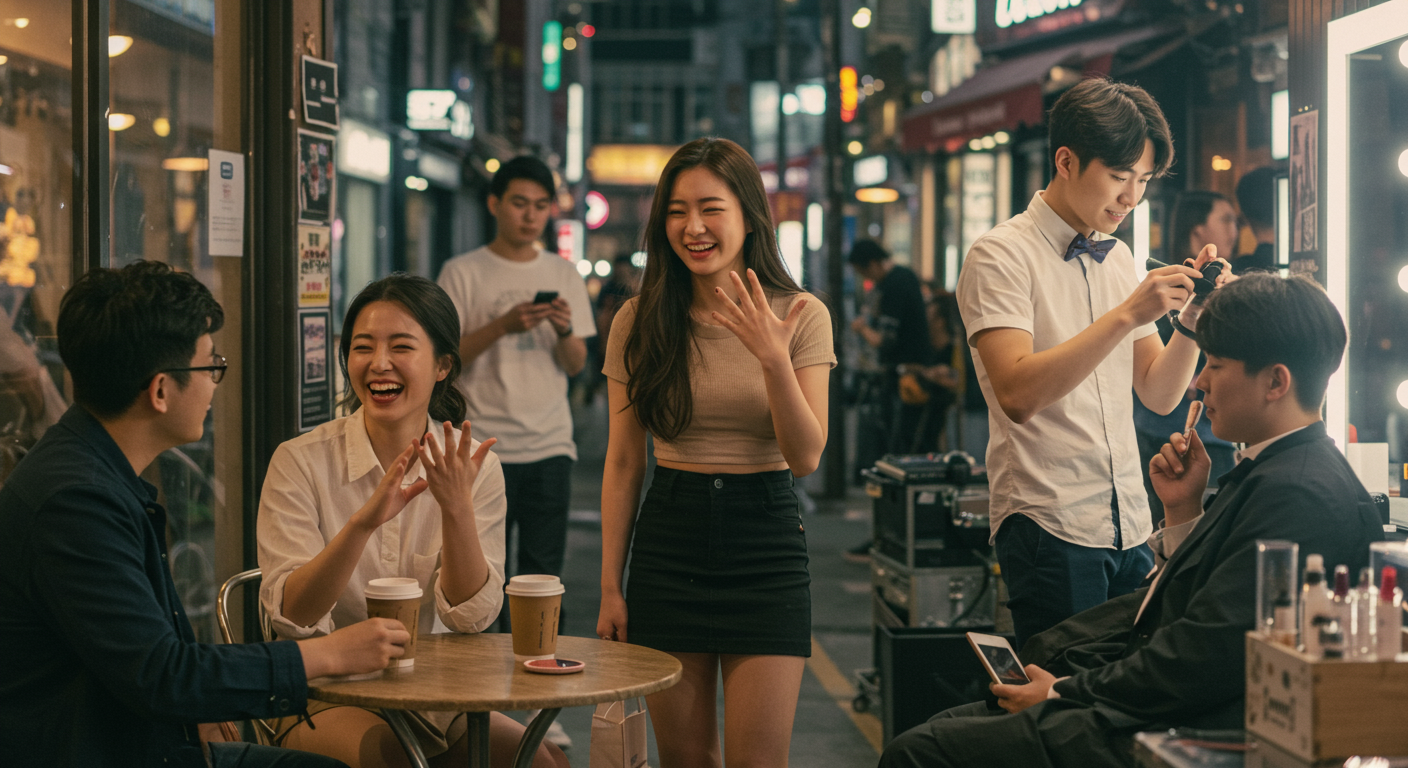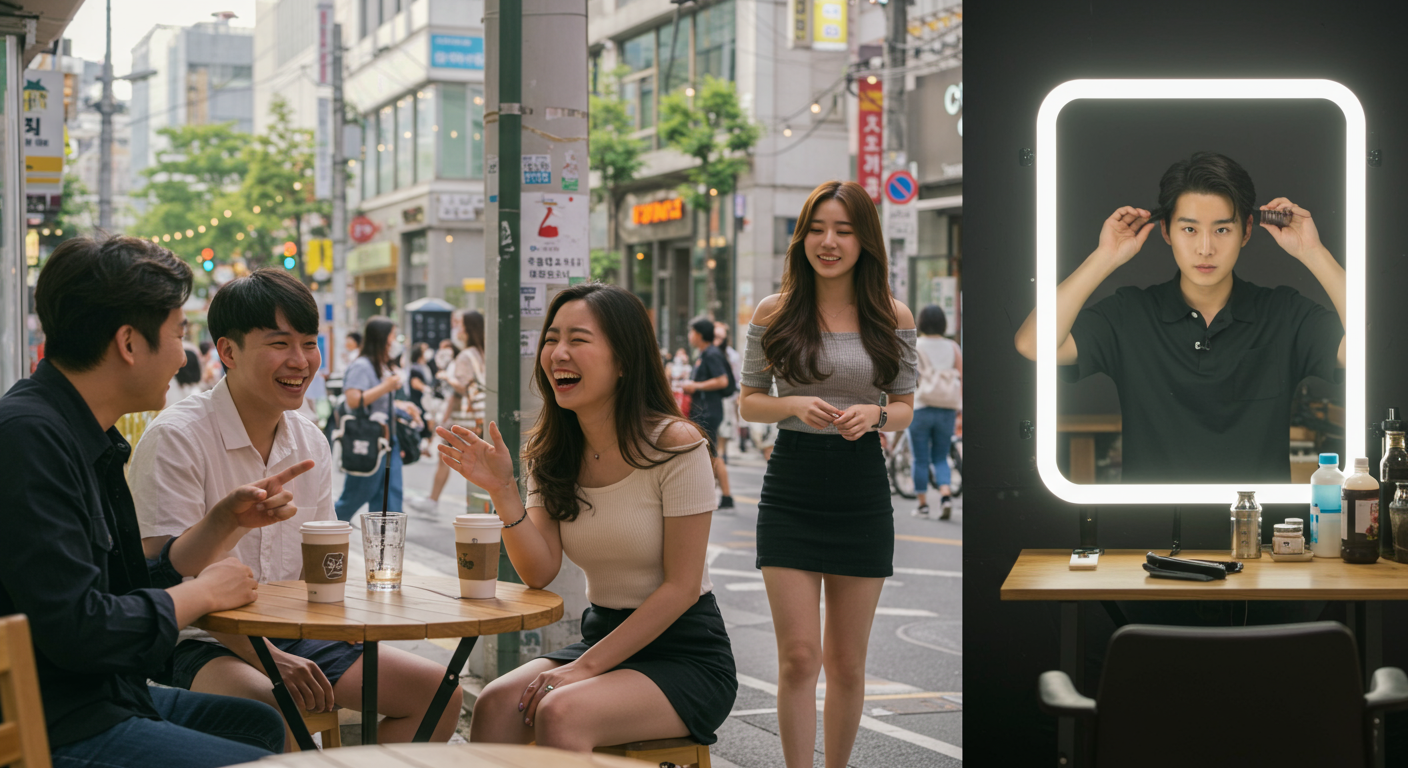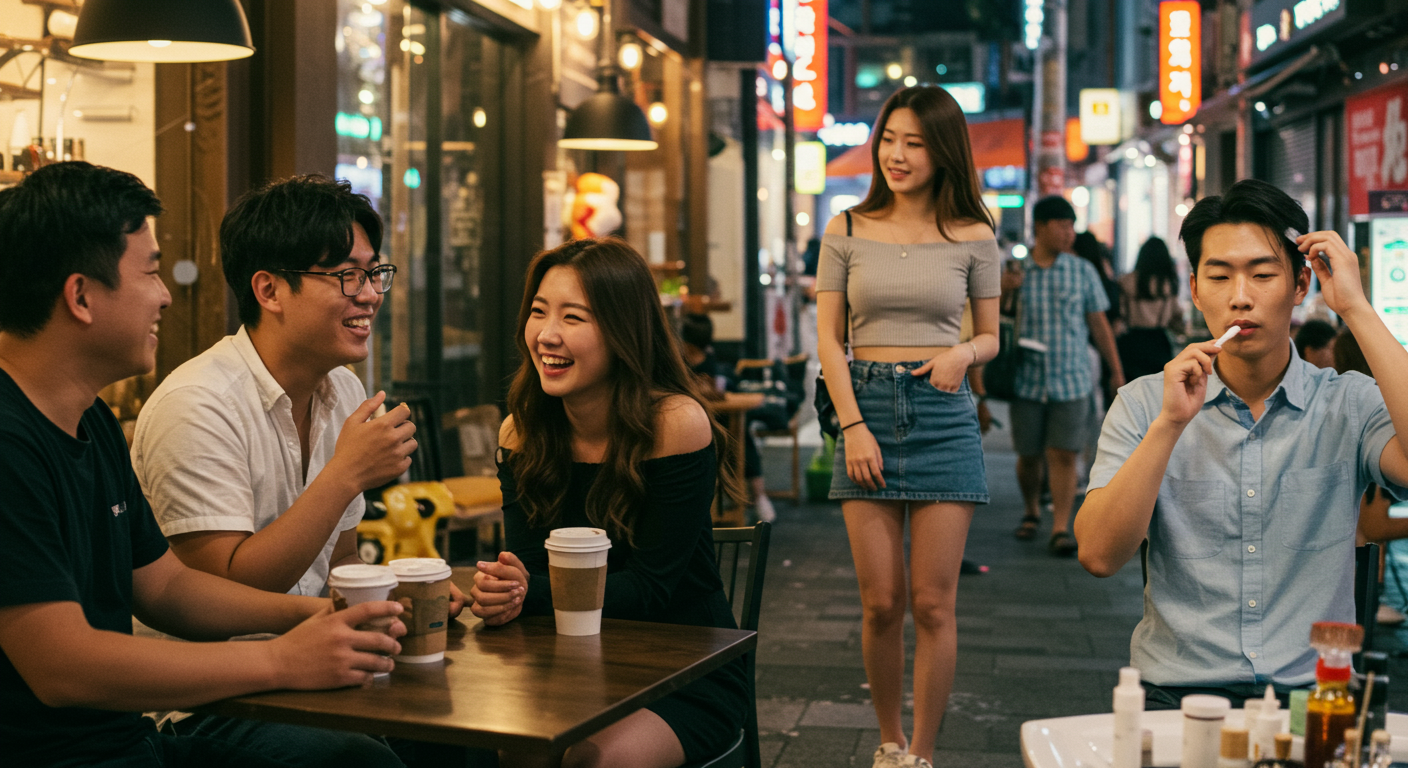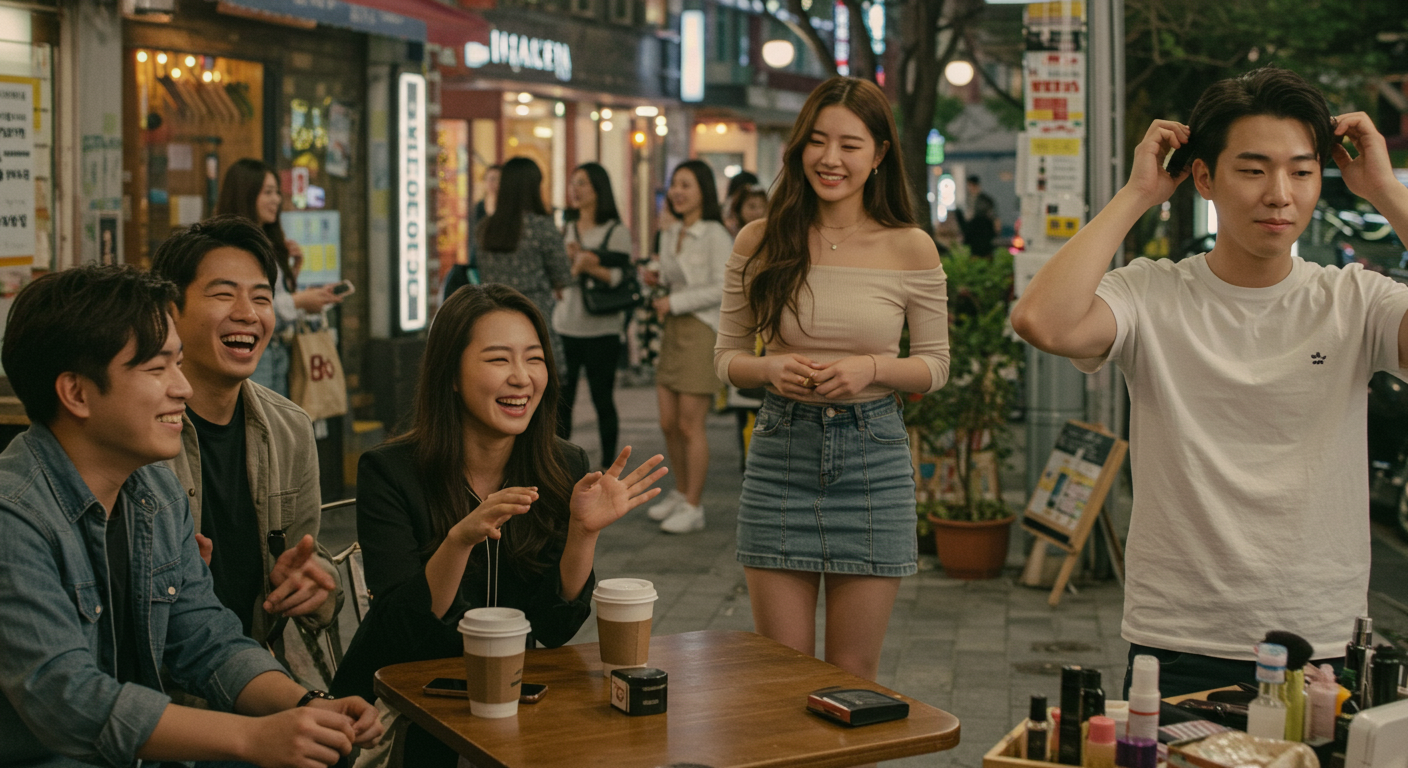Unfiltered Korean Beauty: Beyond K-Pop & Into Real Life
Unfiltered Korean Beauty: Beyond K-Pop & Into Real Life
Ever wondered if the dazzling Korean beauty standards we see in media actually apply to everyday life? Do regular Koreans face the same intense pressure around their looks?
Honestly, it’s a question that’s been lingering in my mind for ages. We’re constantly bombarded with images of flawless K-Pop stars and actors, making it hard to grasp the reality for the average person. To get some genuine answers, I recently gathered four incredible Korean adults – Sage, Jeoung, Nuri, and AJohn – for a candid chat. What they revealed was so much more nuanced and personal than I could have imagined. Come along as we dive deep into the often-unseen aspects of Korean beauty, fashion, and lookism.
Table of Contents
Nail Culture: A Small Canvas, Big Statement
Our conversation kicked off with something seemingly small but deeply ingrained: nail culture. It’s not just about neat nails; it’s an art form here! Jeoung mentioned how getting her nails done is a way to express her style and feel good. Sage agreed, adding that while intricate designs are popular, there's also a big trend towards clean, well-maintained nails, even for men. It’s like a subtle nod to self-care and attention to detail that many might not notice unless you’re really looking. This isn’t just for special occasions; it’s an everyday thing for many. I mean, who doesn't love a fresh manicure, right? It just *feels* good.
 Description: "Four diverse young Korean adults, two men and two women, sitting around a stylish café table, laughing and engaged in conversation. There are coffee cups and subtle nail art visible on the women's hands. The background is a warm, inviting cafe interior, with soft, natural lighting. Realistic photo style."
Description: "Four diverse young Korean adults, two men and two women, sitting around a stylish café table, laughing and engaged in conversation. There are coffee cups and subtle nail art visible on the women's hands. The background is a warm, inviting cafe interior, with soft, natural lighting. Realistic photo style."
Pretty Privilege: Is Beauty a Currency?
This topic really hit home. We talked about "pretty privilege" in Korea, which is essentially the idea that attractive people often receive preferential treatment. AJohn, one of our male guests, candidly admitted that he observes this bias even in professional settings. Nuri pointed out how it's almost expected for people, especially women, to maintain a certain image, and how this can create a lot of pressure. It’s not just about looking good, but about how that translates into social and economic advantages. It feels incredibly unfair, doesn't it? But it's a reality many navigate.
Showing Skin: Fashion or Flashing?
The discussion shifted to how much skin is 'acceptable' to show, and it was fascinating to hear the varying perspectives. What’s considered modest or daring can really differ. Our guests agreed that while showing legs might be common, revealing too much cleavage or shoulders in certain contexts might still raise eyebrows, especially in more conservative environments. It's a delicate balance between expressing individuality and adhering to unwritten social codes. I mean, one minute you see an idol wearing something super daring, the next you're in a more traditional setting. Confusing, I know!
 Description: "A young Korean woman standing confidently in a street in Seoul, dressed in a stylish but somewhat revealing outfit (e.g., short skirt/shorts, off-shoulder top). She is smiling slightly, with blurred city lights and people in the background. The atmosphere is vibrant and modern. A candid, realistic photo."
Description: "A young Korean woman standing confidently in a street in Seoul, dressed in a stylish but somewhat revealing outfit (e.g., short skirt/shorts, off-shoulder top). She is smiling slightly, with blurred city lights and people in the background. The atmosphere is vibrant and modern. A candid, realistic photo."
Does K-Pop Really Affect People's Styles?
It’s undeniable that K-Pop has a massive influence, but does it really trickle down to everyday fashion choices? Sage explained that while K-Pop sets trends, people adapt them to their personal style rather than just copying. Jeoung noted that certain idol fashion elements, like specific colors or silhouettes, become popular but are often toned down for daily wear. It’s more about inspiration than imitation, which makes perfect sense. Who wants to look like they're going to a concert when they're just grabbing groceries?
Fashion Faux Pas & What's Trending
What's considered a fashion turnoff versus what’s hot right now? Our panel had some interesting insights. For "turnoffs," AJohn mentioned overly flashy or ill-fitting clothes. Nuri joked about trying too hard. When it comes to "what’s hot," there was a consensus around "clean" and "effortless" looks – comfort meeting style. Oversized fits, natural makeup, and versatile basics seem to be dominating. It’s a move towards a more minimalist yet polished aesthetic, if you ask me.
Here's a quick summary of general fashion vibes:
| Trend Category | "What's Hot" (Generally) | "Turnoffs" (Generally) |
|---|---|---|
| Overall Aesthetic | Clean, minimalist, effortless chic, comfortable but polished. | Overly flashy, ill-fitting, trying too hard, outdated trends. |
| Body Shapes/Silhouettes | Oversized tops, relaxed fit pants, natural body lines. | Too tight or restrictive clothing that hinders movement. |
| Makeup | Natural, 'no-makeup' makeup, focus on clear skin. | Heavy foundation, overly dramatic eye makeup for daily wear. |
Weight, Fitness, and Men's Hair Trends
Body image is always a hot topic, and Korea is no exception. Our panel discussed the intense focus on weight and fitness. There's a strong emphasis on being slim, but increasingly, also on being fit and healthy rather than just thin. This leads to a lot of gym attendance and diet culture. AJohn highlighted how men's hair styles are incredibly important for overall appearance, with trends changing constantly, from natural two-block cuts to more voluminous styles. It's a huge industry, I tell ya.
 Description: "A young Korean man meticulously styling his hair in front of a mirror, using various hair products. The bathroom is modern and well-lit. His expression is focused and determined. The image has a clean, aspirational, advertising-like style."
Description: "A young Korean man meticulously styling his hair in front of a mirror, using various hair products. The bathroom is modern and well-lit. His expression is focused and determined. The image has a clean, aspirational, advertising-like style."
Skin Color, Tattoos, and Social Perception
The preference for lighter skin tones is still prevalent, with many associating it with beauty and elegance. However, the perception of tattoos is slowly shifting. While still somewhat stigmatized, especially in older generations or professional settings, younger people are embracing them more as a form of self-expression. Sage and Nuri discussed how tattoos are becoming more common among their peers, though often discreetly placed. It's like a quiet rebellion, if you will, but still has its social repercussions depending on who you are.
Plastic Surgery & The K-Beauty Empire
Perhaps the most talked-about aspect: plastic surgery. Our guests shared that it's often viewed as a form of self-improvement, not necessarily something to hide. It's openly discussed, and many people consider minor procedures like double eyelid surgery or nose jobs quite normal. This ties into the massive K-Beauty and cosmetics industry, which emphasizes skincare routines, innovative products, and achieving a natural, youthful glow. It's an ecosystem of self-betterment, whether through makeup or more permanent changes.
 Description: "A diverse group of young Korean women and men in a modern, brightly lit beauty store, testing various K-beauty products. They are laughing and interacting, showcasing a friendly and approachable atmosphere. The shelves are filled with colorful cosmetic packaging. A lively, engaging photo."
Description: "A diverse group of young Korean women and men in a modern, brightly lit beauty store, testing various K-beauty products. They are laughing and interacting, showcasing a friendly and approachable atmosphere. The shelves are filled with colorful cosmetic packaging. A lively, engaging photo."
A Heartfelt Message About Beauty
To wrap things up, I asked everyone for a message about beauty. It was truly touching. They emphasized that while external appearance matters, true beauty comes from within – confidence, kindness, and self-acceptance. It’s a journey, not a destination. Jeoung beautifully said, "It's about finding what makes *you* feel good, not just what others expect." I couldn't agree more. It’s a universal truth, isn’t it?
Uncover More About Real Korean Culture!
Want to dive even deeper into the nuances of Korean society and culture? Our exclusive video offers raw, unfiltered insights you won't find anywhere else. Don't miss out on understanding the true Korea!
Watch the Full Discussion Now >>Your Burning Questions Answered: Korean Beauty & Fashion
According to our guests, yes, it can be. While not officially stated, an attractive appearance can sometimes lead to preferential treatment or create an unspoken expectation, particularly in customer-facing roles or industries where image is highly valued. It's a subtle but persistent bias.
The stigma is definitely lessening, especially among younger Koreans who see tattoos as a form of personal expression. However, it's not completely gone. Older generations and more traditional work environments might still view them negatively, leading many to opt for smaller, more discreet tattoos or to cover them up in certain situations. It's a slow but steady cultural shift.
Our guests confirmed that yes, it's quite prevalent and often discussed openly. Many view it as a personal choice for self-improvement, much like getting a new haircut or buying new clothes. Minor procedures are particularly common and generally accepted, reflecting a broader societal emphasis on appearance and self-care. It's integrated into the beauty culture rather than being a taboo subject.
Final Thoughts: A Call for Authentic Beauty
It was truly illuminating to hear these real stories and perspectives from Sage, Jeoung, Nuri, and AJohn. While K-Pop and Hallyu waves set global trends, the everyday reality for Koreans is a complex tapestry of aspiration, personal expression, and navigating societal expectations. They taught me that while external appearances are important, the shift towards self-acceptance and inner confidence is a universal journey worth celebrating.
So, what are your thoughts? Do these insights resonate with your own observations or experiences? Share your perspective in the comments below! And don't forget to check out more discussions from David A. Tizzard and the amazing crew. You can find David on , and follow the fantastic guests:
- Sage:
- Jeoung:
- Nuri:
- AJohn: /
Special thanks to our Patreon members Bhavya and Roxanne Murrell. Join our community on to support more discussions like this!
Music by Jocelyn Clark.
Comments
Post a Comment